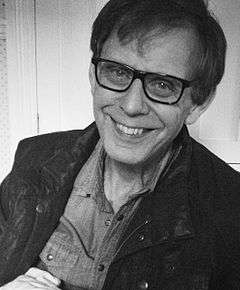Martin Stopford
Martin Stopford is a British economist and has had careers as a teacher, writer, information provider and business manager. Stopford is regularly quoted by The Economist,[1] the Financial Times, Bloomberg and Lloyds List. He received a Lloyd's List Lifetime Achievement Award in 2010.[2][3] He is a director of Clarksons plc, the world's largest shipbroker.[4]
Martin Stopford | |
|---|---|
 | |
| Born | 1947 (age 72–73) |
| Education | Keble College Oxford |
| Occupation | Economist |
| Home town | London, England |
Early life & education
Stopford was born in Bolton, Lancashire in 1947, son of a clergyman. He was educated at Prestfelde School, Shrewsbury and Denstone College, Staffordshire. In 1966 he won an Abbott Scholarship to Keble College, Oxford in 1969 where he studied Politics, Philosophy and Economics (PPE) under Adrian Darby, James Griffin, Paul Hayes and Basil Mitchell. Stopford went on to receive a Doctor of Philosophy Degree in Economics from Birkbeck College, part of the University of London, which he completed in 1979.
Career
Martin Stopford first became involved with the shipping business in 1971 when he joined Maritime Transport Research, a London-based shipping consultancy. He studied seaborne trade, culminating in the publication, with colleagues Jack Griffiths, Sue Bland and John Stapleton of a six volume series of reports “Dry Cargo Ship Demand to 1980” covering the movement of 220 separate commodity trades by sea.
In 1977, Stopford joined British Shipbuilders as Group Economist. In 1981 he became Director of Business Development, where his responsibility for the annual corporate plan drew him into the many problems of the 1980s depression in the shipping and shipbuilding industries. In 1988 Stopford was recruited by Chase Manhattan Bank as Global Shipping Economist, just as the ship finance business was re-discovering itself after the disastrous recession. Then in August 1990, on the day Saddam Hussein invaded Kuwait, he became MD of Clarkson Research. Over a 20-year period, Clarkson Research grew into a sizeable business with over 200 products, serving clients in shipping, shipbuilding, finance, marine equipment and offshore. In 2004 he joined the main Clarksons board.
Academia
In the late 1970s he started lecturing at Cambridge Academy of Transport and in 1989 set up the Anatomy of Ship Finance course which he still leads. He also developed the International Commodity Trade and Transport (ICTC) module at the Centre for Shipping, Trade & Finance at CASS set up by Professor Costas Grammenos[5] in 1984. During the first term he added Shipping Economics and taught both courses until the early 1990s.
In 2009 he was given an honorary Doctorate by Solent University and in 2010 he was the winner of the Lifetime Achievement Award at the Lloyds List Global Shipping Awards Dinner. He is also a Visiting Professor at Cass Business School, Dalian Maritime University, Copenhagen Business School and Newcastle University.
Writing
The first edition of “Maritime Economics” was published Allan and Unwin in 1988. It was the first text book to set out a broad economic framework of the international shipping business which transported over 8 billion tonnes of cargo in 2011. Second and third editions were published by Routledge in 1997 and 2009. In 2005 Maritime Economics was awarded the Chojeong Book Prize for “making a significant contribution to the development of maritime transport and logistics academically and practically”.
Personal life
Martin Stopford has two children, Benjamin[6] and Elizabeth. He lives in London where he cycles to work in the City each day and still keeps a motorcycle. A lifelong horticulturalist, he is a keen gardener and manages a small organic hill farm in Staffordshire Moorlands.
Publications
- Stopford, Martin (1997). Maritime Economics. Routledge. ISBN 0-415-27558-X.
- A Collection of papers by Martin Stopford
Website
The website started as a resource for the book Maritime Economics, but it now includes information about institutions around the world which run maritime courses, and a Study Centre where students can watch video lectures, read papers, take tests, and monitor their progress, either self-supervised or supervised by an authorised tutor.
References
- References to Martin Stopford from The Economist
- Interview with Martin Stopford at the Lloyd's List Global Awards 2010 on YouTube
- Lloyd's List Global Award Winners 2010 Archived 2012-02-21 at the Wayback Machine
- Clarksons plc
- The Costas Grammenos International Centre for Shipping, Trade and Finance
- Ben Stopford (Son)